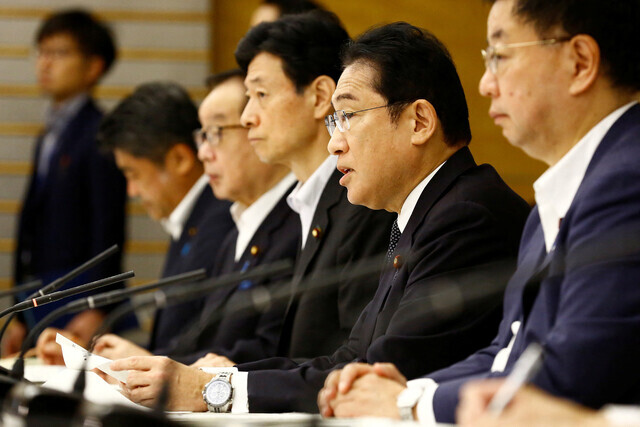hankyoreh
Links to other country sites 다른 나라 사이트 링크
[Editorial] History will remember Korean government’s complicity in Fukushima water dumping

The Japanese government announced it will begin dumping contaminated water from Fukushima into the ocean on Thursday. While Tokyo stresses the “scientific” nature of its plan, there is obviously nobody who can take full responsibility for a process that will last for more than three decades.
While announcing the starting date of the discharge of the contaminated water on Tuesday, Japanese Prime Minister Fumio Kishida claimed that “a wide range of regions and countries have expressed their understanding and support for our actions, which are based on scientific grounds provided by the International Atomic Energy Agency.” But his remarks completely disregard the opposition and concerns of many people, including the Chinese government, countries in the Pacific Ocean, the Japanese fishing industry and the South Korean public, and their requests for an alternative approach.
The discharge of the contaminated water from the Fukushima nuclear power plant is expected to go on for more than 30 years. While the Advanced Liquid Processing System (ALPS) filtration system can lower 62 types of radionuclides to an acceptable level, it cannot filter out tritium, a radioactive isotope of hydrogen. So Japan has resorted to the artifice of diluting the contaminated water with seawater before turning around and dumping it back into the sea.
Groundwater and rainwater continue to seep into the Fukushima reactor core, which melted down after the catastrophic 2011 earthquake in eastern Japan, so large amounts of water are being tainted with radioactivity every day. As a consequence, it’s impossible to say exactly when Japan will be able to stop dumping contaminated water into the ocean.
As soon as the Seoul-Washington-Tokyo summit ended last week, the Japanese government pushed its Fukushima discharge plans into overdrive. Korean President Yoon Suk-yeol and the Korean government have irresponsibly stood on the sidelines or even sided with the Japanese government, without bothering to voice public concerns or counsel Japan to choose a different course.
The Yoon administration has consistently provided indirect support for Japan’s plans to discharge the contaminated water, as reflected by the fact that the presidential office used its own budget to produce a promotional YouTube video in July arguing that dumping the contaminated water won’t endanger Koreans.
Yoon asked Kishida during a bilateral summit in July to allow Korean experts to be permanently stationed at Fukushima to inspect the contaminated water discharge, and the two sides deliberated the matter for a while. But on Tuesday, the Korean government admitted it had reached a watered-down agreement with Japan that allows Korean experts to regularly visit the site, but not to stay on a permanent basis.
Here’s the Korean government’s official stance on Tokyo’s announcement that it will move ahead with the Fukushima water discharge: “We have concluded there are no scientific or technical issues with the discharge plans.” The government added the caveat that “this does not mean we support the discharge.”
Politicians with the ruling People Power Party once again slammed public opposition to the Fukushima water discharge in a seminar on Tuesday, with the party’s policy chief, Park Dae-chul, blasting a “fake news consortium that’s even worse than street gangsters.
So how are we supposed to believe the government’s pledge to ask Tokyo to halt the discharge if it goes down differently than planned?
Please direct questions or comments to [english@hani.co.kr]

Editorial・opinion
![[Editorial] Intensifying US-China rivalry means Seoul must address uncertainty with Beijing sooner than later [Editorial] Intensifying US-China rivalry means Seoul must address uncertainty with Beijing sooner than later](https://flexible.img.hani.co.kr/flexible/normal/500/300/imgdb/original/2024/0517/8117159322045222.jpg) [Editorial] Intensifying US-China rivalry means Seoul must address uncertainty with Beijing sooner than later
[Editorial] Intensifying US-China rivalry means Seoul must address uncertainty with Beijing sooner than later![[Column] When ‘fairness’ means hate and violence [Column] When ‘fairness’ means hate and violence](https://flexible.img.hani.co.kr/flexible/normal/500/300/imgdb/original/2024/0516/7417158465908824.jpg) [Column] When ‘fairness’ means hate and violence
[Column] When ‘fairness’ means hate and violence- [Editorial] Yoon must stop abusing authority to shield himself from investigation
- [Column] US troop withdrawal from Korea could be the Acheson Line all over
- [Column] How to win back readers who’ve turned to YouTube for news
- [Column] Welcome to the president’s pity party
- [Editorial] Korea must respond firmly to Japan’s attempt to usurp Line
- [Editorial] Transfers of prosecutors investigating Korea’s first lady send chilling message
- [Column] Will Seoul’s ties with Moscow really recover on their own?
- [Column] Samsung’s ‘lost decade’ and Lee Jae-yong’s mismatched chopsticks
Most viewed articles
- 1Xi, Putin ‘oppose acts of military intimidation’ against N. Korea by US in joint statement
- 2For new generation of Chinese artists, discontent is disobedience
- 3[Editorial] Transfers of prosecutors investigating Korea’s first lady send chilling message
- 4[Column] When ‘fairness’ means hate and violence
- 5[Editorial] Intensifying US-China rivalry means Seoul must address uncertainty with Beijing sooner t
- 6How K-pop broke the internet — and broke into the US market
- 7[Exclusive] Unearthed memo suggests Gwangju Uprising missing may have been cremated
- 8‘Shot, stabbed, piled on a truck’: Mystery of missing dead at Gwangju Prison
- 9Naver to acquire Canada’s Wattpad to fuel its IP ambitions
- 10AI, robots won’t free us from work - they’ll make our jobs worse